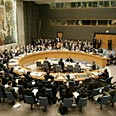
Analysis / Assad still doesn’t get it
Security Council resolution lays groundwork for more severe moves in future, Syrian president would not turn in his brother, brother-in-law under any circumstances, Syria expert says
The remarks followed a United Nations Security Council resolution that fell short of threatening Damascus with sanctions but called on Assad to fully cooperate with the investigation into Hariri’s assassination.
“The Syria regime is in trouble, but it appears that despite everything Assad has not yet grasped the rules of the game,” Tel Aviv University professor Eyal Zisser says. “I don’t see a situation where he would give in to dictates and turn in his brother, Maher, and his brother-in-law, (Head of Military Intelligence) Asef Shawkat to face an international inquiry.”
“The (Security Council) resolution was softened, but on the other hand the United States accepted the decision, which means the Americans got what they wanted,” Zisser says. “The resolution doesn’t impose sanctions, but it lays the groundwork for a very severe resolution against Syria in the future.”
In the meantime, everyone will wait for the findings of chief investigator Detlev Mehlis, with the international inquiry expected to continue until December 15.
It will be interesting to see what will be the nature of the lessons learnt in Damascus – will it try to cooperate with the investigation committee or will it in fact try to make it more difficult for investigators and press potential suspects to remain silent.
"It is difficult to see a situation where the final report to be submitted in mid December will acquit Syria," Zisser says.
"If indeed Syria will be accused in the final report, even if the Security Council does not pass a resolution with sanctions against Syria – it seems that a similar decision on the part of the European Union and the United States will be difficult enough. Sanctions from these two will achieve the same effect, even if China and Russia will not support it in the Security Council and provide the international prestige," he adds.
Waiting for Mehlis
And what will happen now? How far will Assad go in order to accommodate the international community?
Zisser finds it hard to believe that Assad will go too far.
"The Syrian regime is very embarrassed now, after even Algeria, which is supposed to represent its (Syria’s) interests in the Security Council, supported the resolution," he says.
"The Syrians are now given a timeout in which they can try and escape the crisis they are facing, but it is hard to see them doing that. It seems that they will try to concede through tactical measures, such as strengthening the patrols around the Iraqi border or something similar," he says.
"In the past few days there were reports that the Syrians have boosted their controls on movement into and out of their territories, but this does not look serious. Even the Quartet, including Russia, were not convinced that Syria did in fact close the Islamic Jihad headquarters in Damascus, as it had claimed, and therefore Assad is in very big trouble," Zisser explains.
In the meantime it seems that the next phase in Assad's dealings with the international community is in the hands of Judge Mehlis. If he will present solid and convicting evidence attesting to Syria's involvement in Hariri’s assassination, the next anti-Syria resolution will be much harsher.










